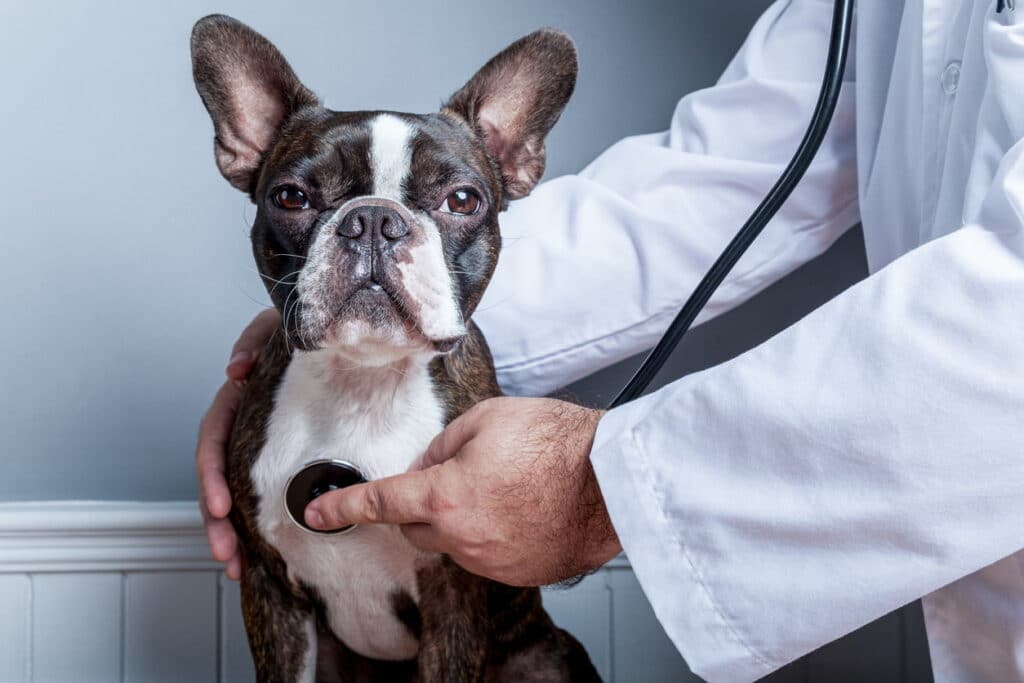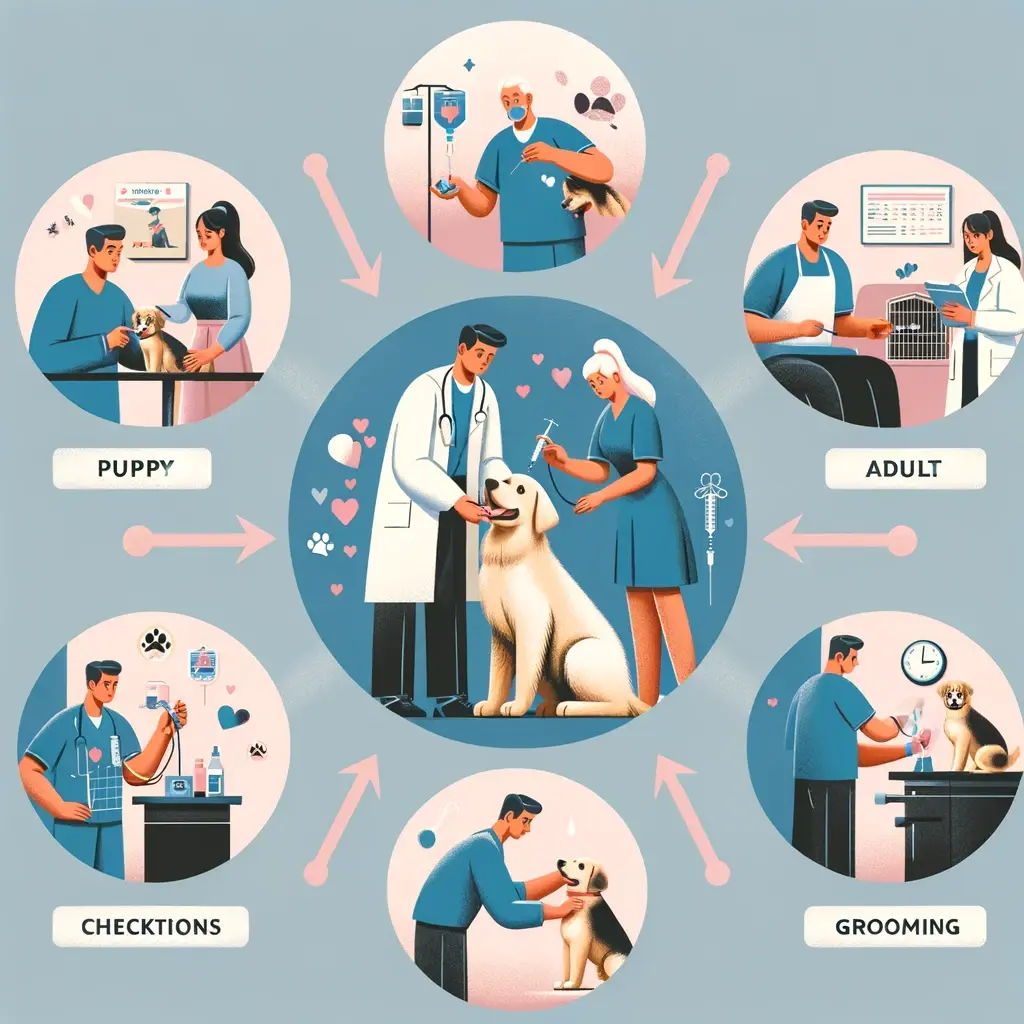How Often Should I Take My Dog to the Vet? Just as we believe in keeping up with regular check-ups with the doctor to maintain our health, even our pets need a regular fitness regime.
Here’s a breakdown of dog vet visits, why they’re important, and what to expect:
How Often Should I Take My Dog to the Vet?
- Puppies: Frequent visits initially (every 3-4 weeks until 16 weeks old) for vaccinations and checkups.
- Adult Dogs: At least once a year for a wellness exam, vaccinations, and parasite checks.
- Senior Dogs: Twice a year for more thorough checkups, including bloodwork and other diagnostics to catch age-related issues early.
Reasons for Vet Visits Beyond Standard Checkups:
- Illness or Injury: Address any issues promptly, including:
- Unusual eating/drinking habits
- Breathing difficulties
- Vomiting or diarrhea
- Lethargy, weakness
- Behavioral changes
- Dental Care: Regular cleanings and checkups prevent gum disease and tooth decay.
- Grooming: Some vets offer nail trimming, bathing, etc., helping maintain hygiene.
Benefits of a Good Wellness Plan
- Early Detection: Regular checkups catch problems like arthritis or infections sooner, making treatment easier.
- Prevention: Vaccinations, parasite control, and dietary advice safeguard your dog’s health.
- Building a Relationship: Your vet gets to know your dog, establishing a baseline for their normal health.
Making Vet Visits Easier on Your Dog
- Treats and Praise: Make it a positive experience!
- Tire Them Out: A walk or playtime beforehand can help them relax.
- Consider Calming Medications: For extremely anxious dogs, talk to your vet.
Why Vets Rock:
- Dedicated to Animal Care: They love and treat pets as their own.
- Wide Range of Services: From checkups to surgery, they provide comprehensive care.
- Healing Touch: They work to improve your dog’s physical and mental well-being.
Before and After the Vet Visit
- Before:
- Gather medical records, medication list, and details about eating/drinking habits.
- After:
- Schedule the next appointment.
- Follow vet instructions on medications and monitor for any changes in your dog.
Key Takeaways
- Regular Vet Visits are Essential: Protection, early detection, and establishing a healthy baseline are key.
- Don’t Wait for Emergencies: Address any unusual symptoms or behaviors promptly.
- Vets are Your Partners in Pet Care: They guide you in providing the best life for your furry friend.
Contents
- 1 How to Maintain a Wellness Regime and Take Care of Your Dog’s General Health?
- 2 When to Run to the Vet with Your Dog?
- 3 Healthy Dogs Guide: Give Your Dog a Good Life with These Preventive Measures
- 4 How Can a Good Wellness Plan Deter Common Dog Health Problems?
- 5 How to Make Your Pet Dog Comfortable While the Veterinary Visit?
- 6 Why are Vets a Boon for Your Dog?
- 7 What to Do Before and After the Vet Visit?
How to Maintain a Wellness Regime and Take Care of Your Dog’s General Health?
Vet visits are a must when you have a new pet dog at home. Every minute detail, including their vaccinations, dental check-ups, grooming, healthy food supplies, and annual dog vet visits, requires planning and supervision.
These will help your dog remain fresh and clean with regular grooming, including nail clipping, bathing, and brushing away any flies or insects from their fur.
Visiting the Vet with Your Puppy
When you get a puppy at home, making frequent visits to the vet becomes a priority. These vaccines usually start when the pups are 3 months old. Therefore, they require vaccinations during the early period, which would be once in 3 to 4 weeks till the 16-week time frame.
Vaccinations given at the right time help the puppy build a robust immune system and protect them against the parainfluenza virus and many other diseases.
At this stage, you must discuss nutrition, exercise, and the well-being of your puppy with the veterinarian. A vaccination schedule also needs to be followed as per your puppy’s needs.
Taking Your Adult Pet Dog for Vet Visits
After the age of 1, the puppies turn into adult dogs and require an annual check-up program. Here, they have a complete physical check-up done. Their weight is checked along with vital statistics of the heart and lungs.
Apart from their joint and bone health, even dental care gets covered during these yearly visits to the vet.
Annual visits may also include fecal tests in a few cases as the dogs need to be checked for intestinal parasites like roundworms or hookworms.
The visits may vary as per your dog’s breed, and few even need booster shots every 1 to 3 years.
Going for Dental Check-Ups and Regular Dog Grooming Sessions
Dental check-ups are a must in the case of dogs as they tend to carry infections and bacteria that may spread to the liver or kidney, giving way to serious health issues.
Regular grooming of dogs is essential to maintain hygiene and good health. Grooming includes cleaning flies from their furs, bathing religiously, and nail clipping to prevent infections.

How Often Should I Take My Dog to the Vet? – Senior Dogs Requiring More Frequent Dog Vet Visits
Senior dogs require to visit the vets at least twice a year since they are more susceptible to sickness and injury. In addition, after the age of 8, dogs need diagnostic tests that help decipher any future illness.
Apart from blood tests, a few others like ultrasounds, urine analysis, and blood pressure tests are also required.
In addition, the vets keep track of the dog’s weight to know its mobility and joint issues. Booster shots or shots related to parasite control have also been recommended. You should also let the vet know of any behavioral changes to give it the best possible medical care.
When to Run to the Vet with Your Dog?
Apart from your weekly, half-yearly, or annual visits, there may be occasions when the visit to the vet becomes your priority. If the pet animal shows any symptoms that may seem strange, it is time for a hospital visit. A few cases that require immediate attention are as follows:
1. Eating Inadequately
Eating less food or overeating can be due to digestive or obesity issues. It happens when the dogs have consumed any household cleaners or something toxic.
2. Breathing Issues
After exercising or on hot days, dogs tend to pant a little. But this problem usually stops in a day. However, if the breathing issue continues till the next day, then a visit to the vet is a must.
3. Bone Injury
Bones might have been broken due to a fight or fall from height. Broken bones make dogs uncomfortable as they are unable to communicate their pain.
4. Excessive Water Consumption
In the event of your dog drinking water more than is necessary without much movement or exercise, there is a reason to worry as it can be a sign of kidney-related problems or diabetes.
5. Vomiting or Diarrhea-Related Problems
Repeated bouts of vomiting or diarrhea can cause problems like dehydration. Sometimes vomiting happens due to indigestion. However, severe cases need to be attended immediately.
6. Behavioral Change
You can find similarities in human and dogs’ behavior. For example, your dog being cranky can signify distress or pain. Sudden barking or growling can also be signs of pain and misery.
7. Sudden Coloration or Damage to the Skin
Allergies can lead to skin changing color or turning dull and dry. These can lead to skin rashes and irritation to the pet.
8. Unusual Discharge Out of the Eye
Injury to the retina due to infection or a scratch can cause red eyes. Also, discharge from the eyes can lead to vision not being clear in your dog due to allergies.
9. Inactivity
If your dog has been inactive or sluggish for a long time, especially when lethargic or sleepy, it may be better to take the pet to the vet.
Few medical issues like hard abdomen, sudden weakness, open wounds, vomiting blood, and pale gums may also require an emergency visit to the vet.
Healthy Dogs Guide: Give Your Dog a Good Life with These Preventive Measures
Preventive healthcare offers protection against unwanted diseases and parasites, and early detection always helps treat the problems quickly.
1. De-Worming Treatments
Dogs can be affected by tapeworms or a roundworm. Those dogs or puppies infested with these worms generally show symptoms like loss of appetite and weight, distended bellies (in puppies), anemia. Proper guidance from the vet can help treat this condition.
2. Spaying or Neutering
Spaying and neutering offer protection against urinary infection and cancer. It also helps control the population and decreases the chances of pregnancies.
3. Regular Exercising
Providing your pet dog with healthy food is a must to avoid respiratory and heart diseases, cancer, and diabetes. Along with healthy food, it is necessary to exercise your dogs by going on daily walks.
4. Parasite Control
Indoor pets can get fleas and ticks due to pests and bugs that fly. Medications may help prevent these, along with fresh air and proper sunlight.
5. Provision for Animal-Friendly Space
Your house and garden should be pet friendly so that there are no chances of your dogs getting hurt due to sharp objects lying around. Also, you should bring dog-friendly toys for your furry friend to render them a safe environment.
6. Regular Dental Check-Ups
As dogs are prone to dental problems after a certain age, dental care is essential for pet care.
How Can a Good Wellness Plan Deter Common Dog Health Problems?
Wellness plans do not eliminate the health problems of your pet. They only help control the severity of that disease.
The common problem of arthritis found in dogs can be detected through regular checks for lumps and bumps. Thus, regular check-ups help detect endocrine issues and arthritis early.
How to Make Your Pet Dog Comfortable While the Veterinary Visit?
Most times, dogs are uncomfortable visiting the vet due to their touching and caressing while check-ups are done. Hence, what will work for them is providing them with treats to keep them happy and calm.
Taking your pet for a walk or play can tire it out and prove to be an excellent time for the vet visit. Calming medications are also available in severe cases.
Why are Vets a Boon for Your Dog?
Vets take care of the grooming of the pets in a few cases. Grooming includes nail trimming and bathing of the pets.
They also treat your pets like their own. Vets have their ways of getting close to your dog, and they never hesitate to love and care for them as their own. It helps pets feel quite comfortable during the visits.
Vet work includes everything right from simple medications to hardcore surgeries. They take care of simple things like vaccinations, x-rays, and even emergency surgeries.
The animal doctor simultaneously helps heal the animal physically and mentally. The way the vet works around the dogs while treating them is commendable. They show their love for the dogs who are being treated.
What to Do Before and After the Vet Visit?
Before you take your dog to the vet, you ought to take care of a few things:
- Names of your dog’s medications.
- Past medical history with details of the list of vaccinations completed till date.
- Food and drinking habits.
Below are the things you need to follow right after the vet visit.
- Schedule the next appointment once your dog’s routine check-up is complete.
- During a health emergency or allergies, check for symptoms that need attention.
- Any change in medications must be strictly monitored under the vet’s guidance.
Thus, no matter how young or old your pet dog is, taking it to the vet regularly can keep a check on its health and well-being.
So, we hope by now you must have gotten the correct answer to your query, how often should I take my dog to the vet. Thus, what are you waiting for? Book your appointment with the vet today!








